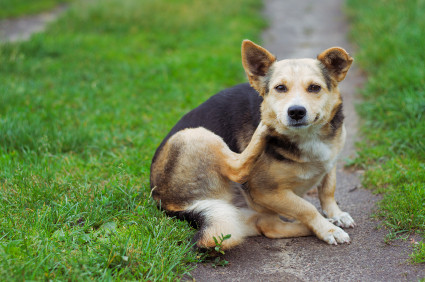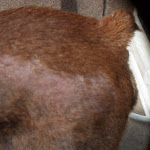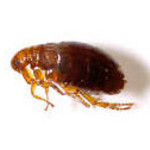Causes of Dog Itching
If your dog’s itching is excessive, it is an indication that there is something the matter. While occasional itching and scratching is normal, if it is happening enough that you notice it, then you need to learn how to stop dog itching. If you don’t, the condition will worsen and can lead to all sorts of problems down the road – from secondary bacterial skin infections to hearing loss.
You would think dog itching should be a relatively simple problem to overcome, right? It would be if we could question our dogs. The problem is, we can’t, so we must play detective and use our best guess as to the cause – of which there can be many. Once the cause is determined, at least a plan of action can be formed.
You can give your pet itch relief using a medicated dog shampoo for itching allergies that is both natural and gentle on your dog.
It is also frustrating when you see your precious doggie constantly scratching and biting. The damage to the surface of his skin caused by his biting or scratching can become infected, and get bloody and raw because of the constant scratching. Sometimes the skin gets infected and can be very painful especially when the itchy feeling doesn’t stop. You could turn to some home remedies like the use of organic coconut oil. In recent years, extra virgin coconut oil for dogs skin has earned the trust of veterinarians and pet owners. It has earned a positive reputation in soothing skin irritation and relieving the itch, as well as controlling fleas and ticks.

Did you know the 5 most common causes of itching in dogs are:
Improper Nutrition

Are you feeding your dog the right kind of food?
Allergies

Just like humans, dogs can suffer from allergies to just about anything…
Mange

Could your dog have mange? Take a look here and see…
Fleas/Insect Bites

Fleas are the number 1 cause of constant dog scratching. Find out what you can do…
Psychological (anxiety/stress)

Did you know one of the symptoms of anxiety in dogs is scratching and licking?
Nutrition
Improper nutrition is actually a HUGE reason many dogs itch and is also commonly misdiagnosed as dog food allergies and other allergies. Depending upon the type and quality of food you feed your dog, they may not be getting what they really need, and their immune system becomes over-stressed – producing itchiness.
Mange in Dogs
Fleas and insect bites
Fleas and insect bites can cause non-stop scratching, especially if your dog has an actual allergy to flea bites. But fleas are probably the easiest to determine: yes or no. Your dog has fleas or they don’t. If they have a really thick coat, it may be hard to tell. Look at the bedding for black specs of dirt. Wet the ‘dirt’ a little – if they turn red, that is flea dirt. Learn all about How to Get Rid of Fleas in Your House and How to Get Rid of Fleas on Dogs. If it is an actually allergy to fleas, keeping your pup flea-free is the only solution.
Fleas and insect bites
Fleas and insect bites can cause non-stop scratching, especially if your dog has an actual allergy to flea bites. But fleas are probably the easiest to determine: yes or no. Your dog has fleas or they don’t. If they have a really thick coat, it may be hard to tell. Look at the bedding for black specs of dirt. Wet the ‘dirt’ a little – if they turn red, that is flea dirt. Learn all about How to Get Rid of Fleas in Your House and How to Get Rid of Fleas on Dogs. If it is an actually allergy to fleas, keeping your pup flea-free is the only solution.
Anxiety/Stress
Psychological problems that cause itching and licking can be very hard to determine. Believe it or not, dog separation anxiety is a huge and growing problem, as is noise anxiety (fireworks, thunderstorms). Dog anxieties manifest themselves in many ways, and dog itchy skin is one of them. Refer to Dog Calming Products as a starting point for ways to help your dog.
Allergies In Dogs
Allergies was last because there can be so many things your dog is allergic to. And if you go through the above list and still find your dog itching constantly, then you can dive into determining the allergic trigger. For example, improving your dog’s nutrition may very well take care of any food intolerance that your dog has, which may be the very reason for all the scratching.
How Do You Know If Your Dog Has Allergies?
Learn how to figure out if your dog has allergies, and what to do about it to find your dog some relief. Your dog would do it if they could.
Is your dog itching but no fleas are to be found? If you’ve already ruled out mange in dogs, then the next logical step in the diagnosis is allergies. Allergies in dogs, like with humans, are difficult because there are so many things that can cause an allergic reaction.
Aside from fleas, the second most common reason for dog itching and licking is allergies. It is also the hardest problem to pinpoint, because just like people, dogs can be allergic to anything.
Dog Allergies Symptoms
Common allergens for dogs are food, inhalant (atopy), and flea bites. Listed below are some of the more common symptoms of dog allergies:
- excessive itching and
- scratching
- hot spots
- bald spots
- recurring ear infections
- nasal and eye discharge
- continuous sneezing
- odors (gas and stool)
- obsessive licking
- excessive shedding
- dull coat
Dog Food Allergies
Although much is said about food allergies in dogs, true dog food allergies are the least common allergy among dogs. How to tell if your dog is intolerant towards a particular food is by using the elimination diet. And unfortunately, food allergies in dogs cannot always be accurately determined with blood tests. More often than not, your dog develops a food intolerance, not a true allergy – and this is GOOD news because a healthier dog food might be all your dog needs. Choose special formulated and the best dog food for allergies to alleviate food allergy-related health issues. Many pet owners opt for grain-free, or limited-ingredient dog food to avoid some ingredients that might cause distress to their dogs. Limited ingredient dog foods provide high quality nutrition giving your dog a safe, and satisfying meal.
How Do You Know If Your Dog Has Allergies
The only way to reliably tell if your dog is allergic/intolerant to a food is by using the elimination diet. This is where you provide one new protein source and one new carb source for your dog to eat, and only eat this, for 8 to 12 weeks. There should be no treats or table scraps while on the elimination diet.
CAUTION: If you have a special needs dog, a puppy, or a pregnant or lactating dog, the elimination diet may not be advisable, as your dog may not be getting all the necessary nutrients during this time period. Consult with your vet before any change of diet.If your dog food allergy symptoms disappear (this will not happen for a couple of weeks), then it may be a food allergy. To confirm this, after the 12 week elimination diet is completed, you can either go back to the old diet or try introducing foods one at a time and watch for reactions. The most common foods to provoke allergies in dogs are wheat, corn, chicken, dairy, and soy – although anything can be the culprit.
If you don’t want to, or don’t feel comfortable feeding your dog as described above, then the best food for dog food allergies would be a quality hypoallergenic dog food, which is packed full of nutrients your dog needs. Lack of quality nutrients can actually frazzle an immune system, causing it to always be on the attack and mimic allergies.
A hypoallergenic dog food has a limited number of ingredients which helps to reduce the possible allergens your dog is exposed to. Some of these foods will also use ingredients your dog has probably never had, such as duck, venison, barley, and sweet potatoes, and thus have no adverse reactions to. Many people see a great improvements in their dogs allergies just by switching to hypoallergenic dog food. While not the most common reason for an allergy, dog food is by far the easiest to control for testing. Two of the best hypoallergenic dog foods are Wellness Simple Solutions and Natural Balance LID.
Feeding your dogs with the right food will stop your dog itching.
Inhalant Dog Allergies
Inhalant and atopy (absorbed through the skin) dog allergies can also cause skin allergies in dogs. Inhalants can include pollen from trees, grasses, and flowers. Atopy allergies to rubber and plastics are also common, as well as different fabrics, like wool and nylon. Another culprit are chemicals that are used on carpets and chairs. Remember, your dog is constantly on the ground and therefore constantly breathing and rubbing on the toxins of these chemically treated items, much more so than humans, and are a common cause of dog skin allergies. With dog allergies itching is one of the most common symptoms of allergies in dogs and trying to determine the cause can become very frustrating for the pet owner.
Dog Allergies Treatment for Inhalents
If the dog skin allergy symptoms are seasonal, then pollen is a good bet. Unless your dog is tearing up his skin with all the scratching, most people just tend to let it play out, as it usually only lasts for a few weeks. If the scratching is too much, try a colloidal oatmeal dog shampoo and/or a spot-on itch relief treatment.
For other types of allergens, such as chemical or fabric, finding the source may be more difficult. Watch where your dog goes in the house and try to isolate what may be causing the problem. If you just started using a new cleaner, try changing to a new one. A new dog bed? Take it away. If nothing new has been introduced, then you will have to test with the trial-and-error method. Remember, an allergy can pop up anytime and to just about anything, even something that the dog has been accustomed to for years (I know – not very helpful!).
Something which also may help is to boost your dog’s immune system with Omega-3 supplements. These have been reported to help alleviate some allergy symptoms and could make your dog more comfortable during pollen season.
When dealing with any type of pet allergy symptoms, improving nutrition is always a great place to start. Your dog can never be too healthy and all the symptoms from dog allergies (scratching, ear infections, and digestive issues) creates a lot of stress on your dog’s body. Boosting the immune system and adding extra essential fatty acids can only help your dog cope as you figure out the problem. If you need recommendation on good quality omega 3 supplements for your pooch, you can check out the reviews by Dog Lovers Pup and other pet related websites to get more information on supplements for dog allergies.
Natural Remedies To Stop Dog Itching

There are many natural dog itching remedies that provide immediate relief for your dog’s itchy skin until you find his problem (nutrition, allergies, fleas, mange, anxiety).
All natural products are just safer for your pet, your family and the environment. There are several types of remedies, from salves to bathes, to help with your dog’s constant scratching.
What To Look For In Natural Itching Remedies
Below are some of the more common natural extracts and oils used in natural remedies AS TOPICALS to stop dog itching, help with dog skin allergies, condition the skin, and keep the skin from getting infected.
- Calendula: anti-bacterial agent that also has a quick, soothing itchy dog skin relief to irritated skin.
- Peppermint: acts as an antiseptic agent; also soothes itchy skin and acts as a natural insect repellent. Only use oils that are designated for canines (typically a lower concentration).
- Colloidal Oatmeal: has anti-inflammatory and anti-itch properties that helps reduce the “need to scratch” dog itchy skin.
- Flowers of Sulfur: mild anti-bacterial and anti-fungal agent that also helps relieve itching. Mix with oil (like vegetable oil) and rub gently into coat.
- Aloe Vera: brings immediate cooling relief to fleabites and helps reduce itching and dog dry skin. Aloe contains minerals, proteins and enzymes that help soften the coat and soothe the skin.
- Marshmallow: has been used since ancient times and is used as an anti-inflammatory to soothe and heal surface irritations to the skin.
- Neem: the Neem tree is known as the ‘Heal All’ tree in India; neem acts as an anti-inflammatory, anti bacterial, anti-parasitic, anti-fungal, anti-protozoal and anti-viral. Only use oils that are designated for canines (typically a lower concentration).
- Grapefruit Seed Extract: helps alleviate skin conditions such as irritation, flea bites and mange; also helps to control bacterial infections and parasites. Only use extracts that are designated for canines (typically a lower concentration).
- Tea Tree Leaf Oil: a powerful anti-septic and anti-fungal agent which does not irritate the skin, it relieves pain and disinfects; also soothes insect bites. Only use oils that are designated for canines (typically a lower concentration).
When looking for all-natural dog itching remedies, you definitely want to see many of these compounds in the ingredient list for the maximum itch relief for your dog. The most popular contain one or more of the following: Calendula, Tea Tree Oil, Neem, and Aloe Vera.
Topical Dog Itching Remedies
To provide immediate relief for your dog’s itching, try using a topical, such as an oil, lotion, or spray. These types of itching treatments should be a definite weapon in your arsenal for dog allergy remedies.
Topical remedies are applied to exactly where your baby is scratching and usually start working within minutes to help with most dog skin problems. Most contain moisturizers as well to help condition the skin.
You can either purchase or make your own home remedies for itchy dogs, it is more a matter of convenience and comfort level. See above for detailed information on different types of ingredients you should look for in dog itchy skin remedies.
